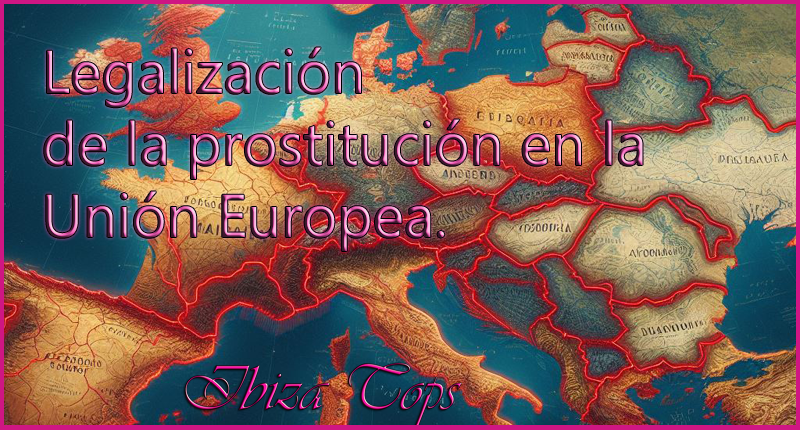LEGALIZATION OF PROSTITUTION IN THE EUROPEAN UNION.
As we have reviewed in our last article, we find ourselves at a time where the debate on the legalization of prostitution is a necessary issue, as well as taking the example of neighboring countries.
To do this, we will analyze the situation of the countries within the European Union where prostitution is regulated and legalized.
We will also review some indices that indicate the effect that the abolition of prostitution has had in the moments in which this policy has been applied.
Most EU Member States are lenient on this activity.
Spain is currently located in the group of countries in which there is a tendency towards abolitionism, imitating the French model, the exercise of which is totally prohibited, although in our country at this very moment it is something totally legal.
In fact, both the prohibition of third-party rentals and the abolition of prostitution are in the air, sanctioning those who rent properties for the practice of prostitution or the clients of prostitutes, even leading to criminal trials, something that the socialist Government estimates that It should be taken to Congress and voted on in the coming days.
However, it seems difficult for this to move forward as they are at odds with their government partners, many of whom are inclined towards regularization.
On the other hand, Germany, Austria and the Netherlands are at the forefront with regard to the incorporation of people who carry out this activity into the formally employed population, given that in them prostitution is not only legal, but is also regulated.
In an issue as controversial as prostitution, it is very important to project the consequences of the applied policies, since these can leave a sector of society as important as any other without protection or rights."Spain is currently located in the group of countries in which there is a tendency towards abolitionism, imitating the French model."
Leaving sex workers themselves out of the debate leads to wrong decisions, based on the loudest voices, of people who might feel that prostitution should be illegal, rather than listening to experienced sex workers and empowering them. to make your own decisions.
NETHERLANDS AND ITS RED LIGHTS.

During the Middle Ages, prostitution was tolerated and the attitude of worldly and religious authorities towards prostitution was pragmatic.
Many cities did it to protect non-prostituted citizens from rape and desecration, to the point that they had the support of the Church.
However, a series of conditions were imposed on them and their clients, for example, whores were not allowed to marry.
They were not protected by law either.
Even though prostitution was considered indispensable, city governments attempted to separate "dishonorable" prostitution from the honorable world and thus, until the 15th century, Dutch cities attempted to keep prostitution outside the city walls.
"Until the 15th century, Dutch cities tried to keep prostitution outside the city walls "
By the 16th century, with the arrival of the Spanish occupation and growing Protestantism, society was strongly influenced.
Sexual activities were only tolerated within marriage.
The Church and the State acted together as a single body and what the church defined as sin, for the government was a crime. Prostitution and pimping were considered a sin and therefore prohibited.
Although not for long since, also in this century the city of Amsterdam began to regulate prostitution, although only the police, the bailiff and his servants could maintain a brothel in Pijl and Halsteeg (now Damstraat).
Prostitutes plying their trade in other areas of the city were arrested and their clients fined.
In 1578, the city of Amsterdam abandoned the Spanish side during the Dutch uprising and converted from Catholicism to Calvinism and with it, the city stopped regulating prostitution.
During the 18th century, working conditions for prostitutes were very bad. There were no adequate contraceptive methods, condoms were not widely available, and there were no effective cures for venereal diseases. Whores and courtesans often became pregnant and had health problems.
Another clear example that when governments do not take charge of this reality, the consequences can be deadly for these women.
This situation did not improve until the 20th century.
Until the 1970s, prostitutes in the Netherlands were predominantly lower-class white women from the Netherlands, Belgium, France and northern Germany. In the 1970s, following Dutch leisure trips to Southeast Asia, women from Thailand and the Philippines began to move there.
In the 1980s there was a second wave coming from Latin America and Africa. In the 1990s, after the fall of the Soviet Union, women came from post-Soviet countries.
Foreign prostitutes were economically motivated to go to the Netherlands.
During the second half of the 20th century, many local governments tolerated prostitution and brothels."During the 18th century, working conditions for prostitutes were very bad.."
The police only interfered when public order was at stake or in cases of human trafficking.
The reasoning behind this gedoogbeleid (tolerance policy) was harm reduction and the belief that enforcement of anti-prostitution laws would be counterproductive and that the best way to protect women was to tolerate prostitution.
This genuine Dutch policy of tolerating formally illegal activities for harm reduction purposes has been and continues to be applied.
The Red Thread (of Rode Draad) is an association for the support and defense of prostitutes that was founded in 1985 and works for the legitimation and against the stigmatization of prostitutes.
Prostitution was defined as a legal profession in January 1988.
The ban on brothels made it difficult to establish rules for the industry, so during the 1980s many municipalities urged the national government to lift the ban on brothels.
In 1983, Minister Korthals Altes presented an amendment to the law on prostitution.
It was not until October 1, 2000 that brothels left their semi-legal status of being tolerated and became fully legal and licensed businesses.
To this day, prostitutes can work as regular employees, although the vast majority work as independent contractors. The Dutch union FNV has since accepted prostitutes as members.
BELGIUM.

Prostitution in what is today's Belgian territory has been practiced (as in all other cultures) since the Middle Ages.
During the Burgundian regime (1384-1482) the regulation of prostitutes was introduced, but it was not strictly enforced.
In Brussels, the public executioner was in charge of controlling trade in the city and throughout the French regime (1794-1814), prostitutes had to frequently undergo mandatory medical check-ups in hospitals.
In 1830, with the Belgian Revolution, the regulations established by the French were maintained.
By 1844, prostitutes were issued identity cards and medical examinations were required twice a week, which was quite abusive and exaggerated.
In 1880 it was discovered that more than 40 minors, mostly English, were working in brothels after being lured to the capital with promises of work in bars and nightclubs.
In addition to prosecuting those involved, the mayor and police chief of Brussels were forced to resign.
During World War I, German soldiers who occupied the country took control of prostitution. To prevent the spread of sexually transmitted diseases among his troops, trade was strictly regulated and the girls were forced to undergo regular health checks.
In the 1940s, the regulatory regime was considered discriminatory towards women, leading to Isabelle Blume's proposals becoming federal law in 1946.
Already by the year 2000, municipalities adopted different approaches to regulation. Some, such as Liège and Ghent, banned window prostitution or moved it out of its traditional locations in city centers.
Others, like Antwerp, completely restructured their red light district and heavily regulated it.
In March 2022, the Federal Parliament approved decriminalizing the work of prostitutes and that of third parties who make the work possible."In the 1940s, the regulatory regime was considered discriminatory towards women, leading to Isabelle Blume's proposals becoming federal law in 1946.."
This law came into force on June 1 of that year. The new law also grants sex workers rights in terms of status, social protection and healthcare, just like other self-employed workers. It also includes social security, unemployment, access to healthcare and parental leave.
The rates of organized crime of human trafficking and violence towards prostitutes have decreased considerably.
AUSTRIA.

As in Belgium, in Austria, during the Middle Ages there are already documents that show that prostitution existed and although the practice was frowned upon, it prospered and was tolerated.However, the whores and courtesans were maintained on one side and the State and the Church on the other.
On the other hand, on Sundays and during Lent they were forced to stay away from the cities, which shows us that they were not accepted as ordinary citizens.
The first recorded mention of the existence of brothels (Freudenhäusern) in Vienna is found in a letter from Duke Albert III of Bavaria (1365-1379).
At first some councilors wanted to create a charitable foundation for prostitutes who would renounce their sinful life, however, they soon ate their words and the councilors themselves established brothels and even financed a brothel with taxes.
The last time prostitution was completely banned in Austria was under the reign of Maria Theresa I of Austria (1740-1780), who sent prostitutes along with other "antisocial" people away from the cities.
In 1850, the Vienna police proposed that prostitutes register, undergo medical examinations twice a week, and obtain special health certificates."The councilors themselves established brothels and even financed a brothel with taxes."
In 1873, Anton Ritter von Le Monnier, head of the corps, reformed Vienna's prostitution law, and since then health certificates have been mandatory.
Prostitutes who met the registration and examination requirements could provide their services without any hindrance.
During 1874 many prostitutes had received health certificates and were under observation by the police and health authorities.
According to estimates, at least 12,000 more women lived off the profits of "free love" without being registered.
Most of them were factory workers who were paid so little that they needed the additional income. Of the registered prostitutes, 5,312 were single, 902 widowed and 210 married. The youngest was 15 years old and the oldest was 47.
Currently, prostitution is regulated and legalized in Austria, and curiously, you can start working in it without having yet obtained a work permit, which takes between 7 and 9 years for an immigrant. Another surprising fact is that only 3 percent of the prostitutes who work there are Austrian.
Finally, homosexual male prostitution was legalized in 1989, one of the main reasons for legalization was to reduce the spread of HIV through regular medical examinations.
SWITZERLAND.

In Switzerland, prostitution has been legal since 1942.
In 1992, the sexual criminal law was revised, since then pimping and passive prostitution are no longer punishable. This does not mean that Switzerland leaves prostitution workers exposed, since article 182 of the Swiss Penal Code is designed to combat human trafficking and article 195 limits the power that pimps can have over prostitutes.
Swiss whores are self-employed as regular work requirements, such as when and where to work, would make the employer breach Article 195.
It is legal to advertise "massages" in newspapers and sex workers are subject to taxes and social security contributions.
Street prostitution is illegal, except in specially designated areas of large cities, which keeps them orderly and at the same time provides greater security for the women and men who offer their services. In fact, Switzerland is one of the countries with the lowest crime and violence rates in Europe.
Local authorities in Zurich installed garage-like buildings called Verrichtungsboxen or sex boxes to protect street prostitutes."Swiss whores are self-employed as regular work requirements, such as when and where to work, would make the employer breach Article 195."
In 2012, voters approved the creation of these spaces in Zurich to control suburban areas. Local authorities called them a "success" after a year
Foreign prostitutes from the European Union can obtain permission to work for 90 days as prostitutes if they present themselves to municipal authorities, undergo a police interview and provide proof of a health insurance plan.
Full service sex work is only legal if the seller is over 18, and it is a criminal act to pay for sex with anyone under 18, until 2013 the minimum age was raised to 16, to adapt the country to a Council of Europe treaty signed in 2010.
The maximum penalty for those who pay to have sexual relations with prostitutes who are 16 or 17 years old is three years in prison. The maximum penalty for pimping minors under 18 years of age is ten years in prison.
While waiting for what is decided to try to do in Spain, we encourage you to continue reading us.
Remember that in IbizaTops you will not find whores or prostitutes but you will find the most beautiful and exclusive international escorts.
IbizaTops. Treat yourself.




